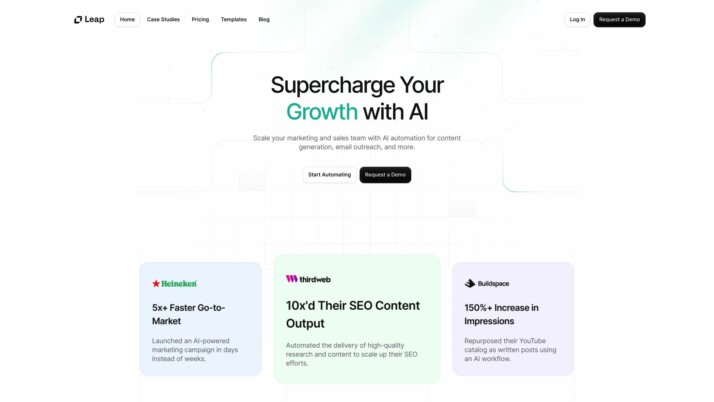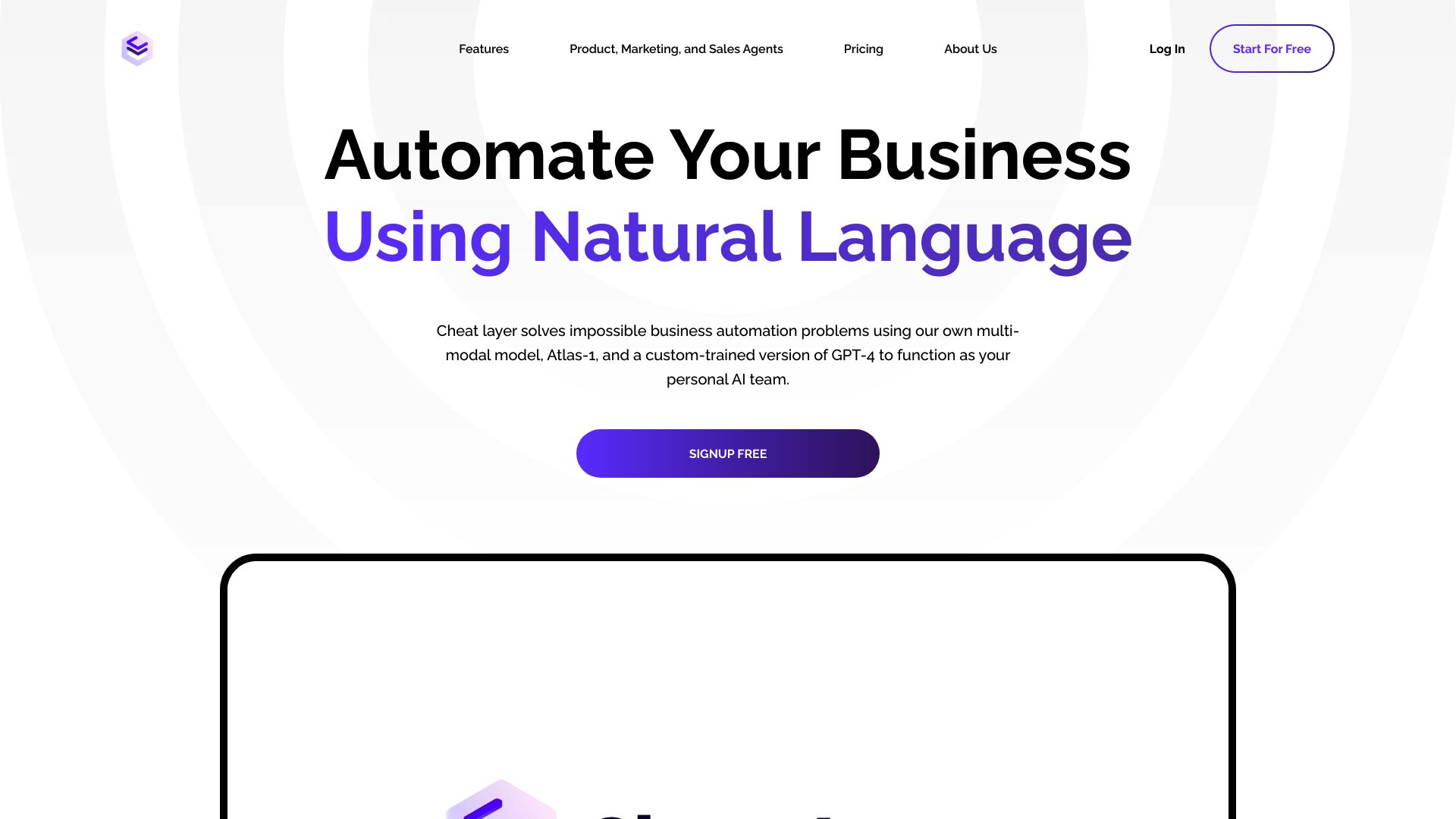Leap AI vs. Cheat Layer: Comparing AI Automation Platforms
AI automation platforms are revolutionizing how businesses operate, offering powerful tools to streamline workflows and enhance productivity. This comparison explores two leading contenders in the field: Leap AI vs. Cheat Layer. Leap AI empowers users to create sophisticated AI workflows through a visual interface, integrating popular models like OpenAI GPT. Cheat Layer takes a different approach, leveraging natural language interactions to generate complex automations. We’ll examine their key features, strengths, and limitations, while also introducing SmythOS as a comprehensive alternative. By the end, you’ll understand which platform best suits your needs for AI-driven automation, scalability, and security in today’s competitive business landscape.
Leap AI Overview
Leap AI empowers users to create sophisticated AI workflows without coding expertise. The platform’s visual interface allows developers and non-technical users alike to build powerful AI applications in minutes. Leap AI integrates with popular AI models like OpenAI GPT and Stable Diffusion XL, enabling diverse tasks from text generation to image creation.
Leap AI excels in providing a comprehensive SDK suite, supporting RESTful API, TypeScript, and Python for seamless integration. Its extensive template library accelerates development of AI applications across various domains. The platform shines in its ability to connect with widely-used tools such as Slack, HubSpot, and Zapier, enhancing workflow automation and productivity.


Leap AI empowers users to create sophisticated AI workflows without coding expertise. The platform’s visual interface allows developers and non-technical users alike to build powerful AI applications in minutes.
Leap AI’s user-friendly dashboard streamlines the creation and management of AI workflows. Users can design, test, and deploy solutions directly from the interface. The platform also offers AI model training capabilities, allowing businesses to fine-tune models on proprietary datasets for improved accuracy and specificity.
While Leap AI offers robust features for AI workflow creation, it lacks some advanced capabilities found in other platforms. The absence of hosted agents for development and production environments may limit scalability for larger enterprises. Additionally, Leap AI does not provide autonomous agent capabilities or advanced debugging tools, which could pose challenges for complex AI implementations.
Leap AI positions itself as a versatile solution for businesses seeking to leverage AI without extensive technical resources. Its strengths in no-code development and integrations make it particularly attractive for small to medium-sized enterprises and marketing teams looking to enhance their operations with AI-driven automation.
Cheat Layer Overview
Cheat Layer offers a powerful business automation solution leveraging AI technology. The platform utilizes a custom-trained version of GPT-4 and their multi-modal model Atlas-1 to solve complex automation challenges using natural language. This approach makes advanced automation accessible even to non-technical users.
The core of Cheat Layer’s offering is the Project Atlas Framework. This innovative system allows users to generate automations of unlimited complexity through simple language interactions. By conversing with the system as if speaking to an engineer, users can create end-to-end solutions without extensive technical knowledge.
Cheat Layer offers a powerful business automation solution… This approach makes advanced automation accessible even to non-technical users.


Cheat Layer’s Semantic Targets feature ensures robust, future-proof automations. By using natural language to define automation targets, the system maintains functionality even when services update their designs. This approach significantly enhances the longevity and accuracy of automated processes.
The platform offers 1-Click Cloud Agents, allowing users to deploy pre-built marketing and sales agents directly from mobile devices. These agents automate processes such as content generation, A/B testing, and lead generation with minimal setup required. Cheat Layer’s Live Mode enables iterative building and deployment of products like apps and landing pages, providing real-time feedback to ensure outputs match intended goals.
While Cheat Layer offers powerful automation capabilities, it lacks certain features found in more comprehensive platforms. The absence of hosted agents for development and production environments may limit scalability for some users. Additionally, the platform does not support autonomous agents or provide explainability and transparency features, which could be crucial for businesses requiring detailed insights into AI decision-making processes.
Feature Comparison
Leap AI and Cheat Layer offer distinct approaches to AI-powered automation, each with its own strengths and limitations. Leap AI provides a visual interface for building AI workflows without coding, integrating popular models like OpenAI GPT and Stable Diffusion XL. Its extensive template library and SDK support enable quick development across various domains. However, Leap AI lacks some advanced capabilities found in other platforms.
Cheat Layer takes a different approach, leveraging a custom-trained GPT-4 variant and their Atlas-1 model to generate complex automations through natural language interactions. Their Project Atlas Framework allows users to create end-to-end solutions by conversing with the system. Cheat Layer’s Semantic Targets feature ensures robust automations that adapt to service updates.
Both platforms fall short in certain areas compared to more comprehensive solutions like SmythOS. Neither Leap AI nor Cheat Layer offer hosted agents for development and production environments, limiting scalability options. They also lack autonomous agent capabilities and advanced debugging tools, which could pose challenges for complex AI implementations.
In terms of security, SmythOS provides a more robust framework with features like constrained alignment and comprehensive data encryption. While Leap AI and Cheat Layer offer some security measures, they don’t match the depth of SmythOS’s enterprise-grade security options.
SmythOS excels in providing a complete ecosystem for AI agent development and deployment. Its hosted agents, advanced debugging tools, and support for autonomous agents offer capabilities not found in Leap AI or Cheat Layer. Additionally, SmythOS’s emphasis on explainability and transparency addresses a critical need in AI development that the other platforms don’t fully meet.
For users seeking a comprehensive, scalable, and secure AI agent development platform, SmythOS emerges as the superior choice, offering a wider range of features and greater flexibility than both Leap AI and Cheat Layer.
Feature Comparison Table
| Leap AI | Cheat Layer | SmythOS | |
|---|---|---|---|
| CORE FEATURES | |||
| Hosted Agents (Dev, Production) | ❌ | ✅ | ✅ |
| Autonomous Agents | ❌ | ✅ | ✅ |
| Explainability & Transparency | ❌ | ✅ | ✅ |
| Debug Tools | ❌ | ✅ | ✅ |
| Multi-Agent Collaboration | ❌ | ✅ | ✅ |
| SECURITY | |||
| Constrained Alignment | ❌ | ✅ | ✅ |
| IP Control | ✅ | ❌ | ✅ |
| COMPONENTS | |||
| Huggingface AIs | ✅ | ❌ | ✅ |
| Data Lakes | ❌ | ❌ | ✅ |
| DEPLOYMENT OPTIONS (EMBODIMENTS) | |||
| DATA LAKE SUPPORT | |||
| Hosted Vector Database | ❌ | ❌ | ✅ |
Best Alternative to Leap AI and Cheat Layer
SmythOS stands out as the superior alternative to Leap AI and Cheat Layer, offering a comprehensive AI agent development and deployment platform. We provide a robust ecosystem that empowers users to create, manage, and scale AI agents with unparalleled ease and efficiency.
Our drag-and-drop interface simplifies the creation of complex AI workflows, making advanced AI capabilities accessible to users of all skill levels. Unlike Leap AI and Cheat Layer, SmythOS offers hosted agents for both development and production environments, ensuring seamless scalability and deployment options.
SmythOS excels in providing autonomous agent capabilities… Our platform enables AI agents to operate independently, performing tasks and interacting with APIs without constant human intervention.
SmythOS excels in providing autonomous agent capabilities, a feature lacking in Leap AI. Our platform enables AI agents to operate independently, performing tasks and interacting with APIs without constant human intervention. This autonomy, combined with our advanced debugging tools and multi-agent collaboration features, sets us apart from both Leap AI and Cheat Layer.
Security is paramount in AI development, and SmythOS delivers enterprise-grade security options that surpass those of Leap AI and Cheat Layer. Our constrained alignment feature ensures AI behavior aligns with organizational goals and ethical guidelines, while comprehensive data encryption protects sensitive information throughout the AI lifecycle.
We pride ourselves on offering a complete solution for AI agent development. Our platform supports a wide range of deployment options, including APIs, webhooks, site chat integrations, and scheduled agents. This versatility, combined with our extensive integration capabilities and support for various AI models, makes SmythOS the ideal choice for businesses and developers seeking a powerful, flexible, and user-friendly AI agent builder.
Conclusion
Leap AI and Cheat Layer both offer innovative approaches to AI-powered automation, but SmythOS emerges as the superior choice for businesses seeking comprehensive, scalable, and secure AI solutions. While Leap AI excels in no-code AI workflow creation and Cheat Layer offers natural language-driven automations, both platforms fall short in critical areas that SmythOS addresses.
SmythOS stands out with its robust feature set, including hosted agents for development and production, advanced debugging tools, and support for autonomous agents. These capabilities, absent in Leap AI and Cheat Layer, provide the flexibility and power needed for complex AI implementations. SmythOS’s emphasis on explainability and transparency also addresses a crucial need in AI development, offering insights that the other platforms lack.
For businesses prioritizing security and scalability, SmythOS delivers enterprise-grade options with features like constrained alignment and comprehensive data encryption. This level of security, combined with SmythOS’s extensive integration capabilities and versatile deployment options, makes it an ideal choice for organizations of all sizes looking to leverage AI effectively.
We invite you to experience the power of SmythOS firsthand. Create a free SmythOS account today and discover how our platform can transform your AI development process. With our 30-day money-back guarantee and unlimited agent creation, you can explore the full potential of AI automation risk-free. Don’t just adapt to the future of AI – shape it with SmythOS.
Last updated:
Disclaimer: The information presented in this article is for general informational purposes only and is provided as is. While we strive to keep the content up-to-date and accurate, we make no representations or warranties of any kind, express or implied, about the completeness, accuracy, reliability, suitability, or availability of the information contained in this article.
Any reliance you place on such information is strictly at your own risk. We reserve the right to make additions, deletions, or modifications to the contents of this article at any time without prior notice.
In no event will we be liable for any loss or damage including without limitation, indirect or consequential loss or damage, or any loss or damage whatsoever arising from loss of data, profits, or any other loss not specified herein arising out of, or in connection with, the use of this article.
Despite our best efforts, this article may contain oversights, errors, or omissions. If you notice any inaccuracies or have concerns about the content, please report them through our content feedback form. Your input helps us maintain the quality and reliability of our information.
